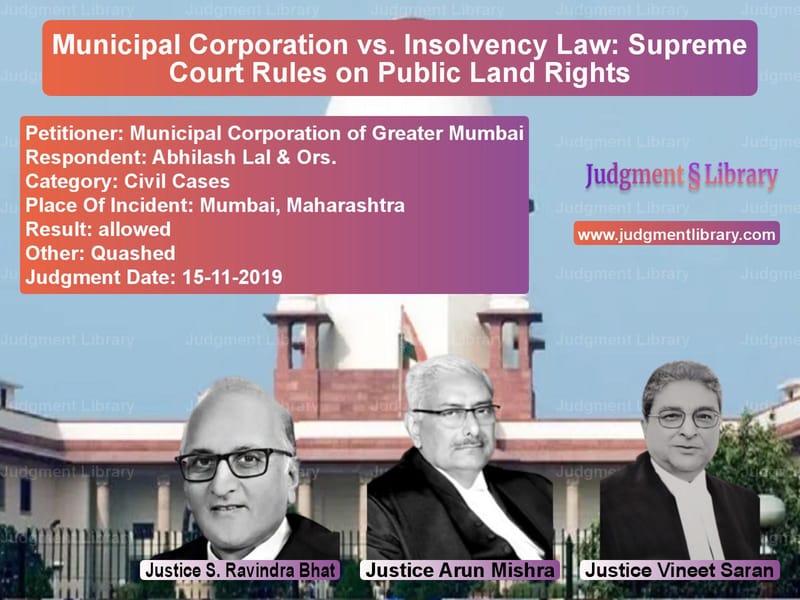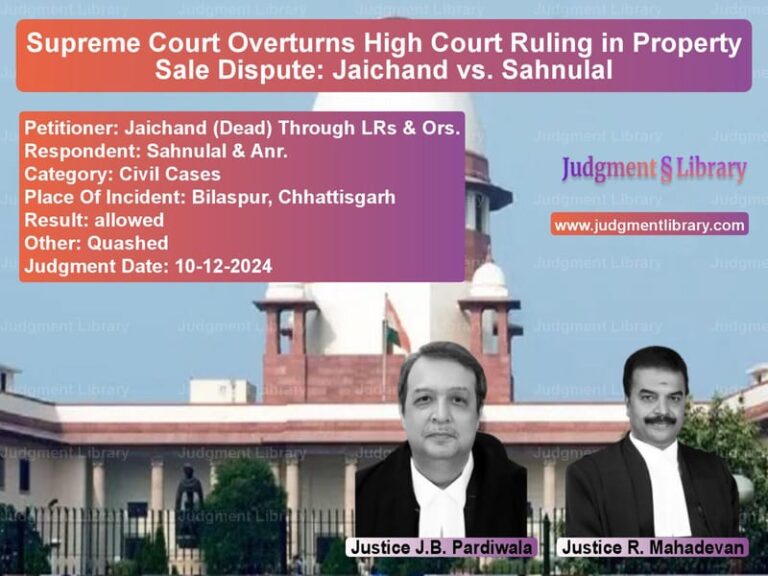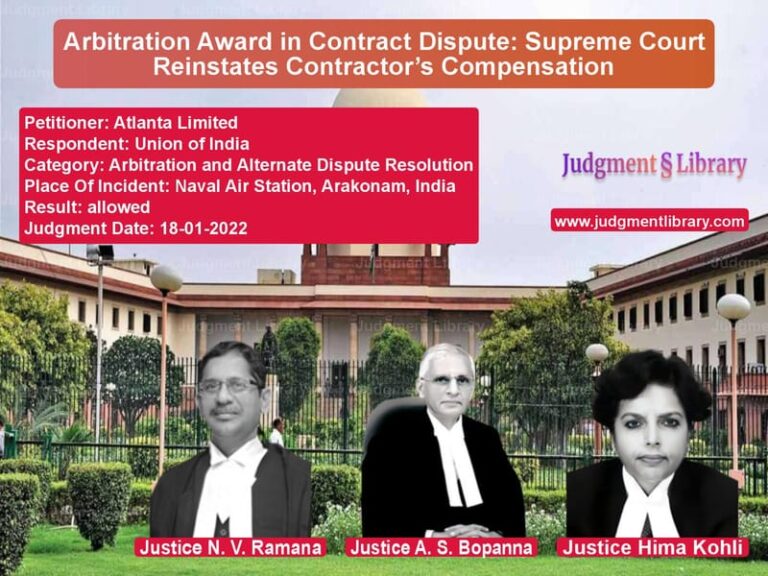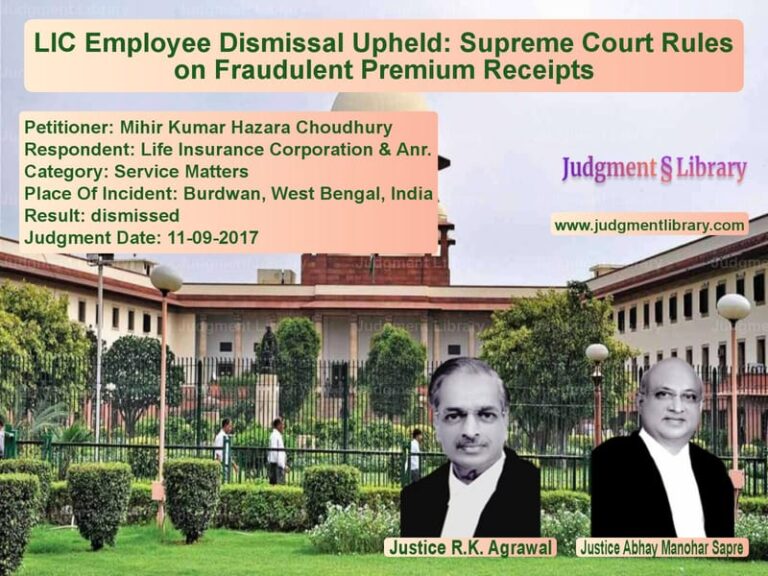Municipal Corporation vs. Insolvency Law: Supreme Court Rules on Public Land Rights
The case of Municipal Corporation of Greater Mumbai (MCGM) vs. Abhilash Lal & Ors. revolved around the conflict between municipal ownership of public land and insolvency proceedings under the Insolvency and Bankruptcy Code, 2016 (hereinafter referred to as the “IBC” or “the Code”). The Supreme Court had to determine whether MCGM’s rights as a municipal authority and public landowner could be overridden by an insolvency resolution plan approved by the National Company Law Tribunal (NCLT) and the National Company Law Appellate Tribunal (NCLAT).
The judgment examined the authority of municipal bodies over their assets, the limitations of insolvency proceedings concerning public properties, and the balance between financial creditor rights and public interest.
Background of the Case
The appellant, MCGM, owned multiple plots of land in Marol, Andheri (East), Mumbai. By a contract dated December 20, 2005, it leased these lands to SevenHills Healthcare (P) Ltd. for 30 years, with the condition that the company would construct a 1,500-bed hospital. The agreement required SevenHills to reserve 20% of beds for economically weaker sections and complete the project within 60 months.
However, SevenHills failed to complete the project and also defaulted on lease rent payments. As a result, MCGM issued a show cause notice on January 23, 2018, proposing the termination of the contract, citing lease payment defaults amounting to ₹76.05 crores.
Meanwhile, SevenHills had borrowed from financial institutions and mortgaged the leased land under Clause 5 of the agreement, which permitted such encumbrances with MCGM’s approval. Due to its financial troubles, Axis Bank initiated insolvency proceedings against SevenHills before the Hyderabad NCLT on March 13, 2018, and a resolution professional (RP) was appointed.
Petitioner’s Arguments (MCGM)
MCGM contended:
- It was the undisputed owner of the land and had never executed a lease deed in favor of SevenHills.
- The contract required approval from MCGM before creating any mortgage or encumbrance, which was never given.
- The resolution plan submitted by Dr. Shetty’s New Medical Centre (SNMC) proposed to mortgage MCGM’s land to raise funds, which violated the Mumbai Municipal Corporation Act, 1888 (MMC Act).
- The resolution plan’s approval by NCLT and NCLAT was invalid as MCGM’s consent was necessary for any transfer of interest in municipal property.
- Section 238 of the IBC, which overrides conflicting laws, does not apply to municipal lands owned for public welfare.
- Since the project was never completed and lease payments were defaulted upon, MCGM had the right to terminate the contract and reclaim its land.
Respondent’s Arguments (Resolution Professional & SNMC)
The respondents argued:
- MCGM had initially agreed to the resolution plan before changing its stance during the proceedings.
- The resolution plan provided for ₹102.3 crores as settlement to MCGM and honored the condition of reserving 20% of hospital beds for the underprivileged.
- The financial creditors had approved the plan as it offered a better return than liquidation.
- Section 238 of the IBC gives precedence to the insolvency resolution process over other laws, including the MMC Act.
- Even if MCGM had objections, they could not override the collective decision of financial creditors in the insolvency process.
Supreme Court’s Judgment
The Supreme Court ruled in favor of MCGM, stating that:
- Municipal land is public property and cannot be transferred, mortgaged, or encumbered without the municipal authority’s explicit consent.
- Section 238 of the IBC does not override municipal laws governing public land ownership and management.
- The resolution plan could not have granted mortgage rights over MCGM’s land without its approval.
- MCGM’s objections were valid since the original lease conditions were violated, and SevenHills had failed to fulfill its obligations.
- The resolution professional and financial creditors could not impose conditions on MCGM’s land without legal authority.
The Court stated:
“Section 238 of the IBC cannot be read as overriding the MCGM’s right – indeed its public duty – to control and regulate how its properties are to be dealt with.”
Key Takeaways
- Municipal authorities retain the right to regulate and control public lands, even in insolvency cases.
- Section 238 of the IBC does not override municipal laws that protect public properties.
- Insolvency resolution professionals cannot grant mortgage rights on public land without municipal approval.
- Financial creditors cannot impose conditions that contradict lease agreements with public bodies.
- This ruling ensures that public interest is protected from corporate mismanagement and financial defaults.
The Supreme Court’s judgment provides crucial clarity on the limits of insolvency proceedings and reinforces the need to protect municipal properties from unauthorized encumbrances.
Petitioner Name: Municipal Corporation of Greater Mumbai.Respondent Name: Abhilash Lal & Ors..Judgment By: Justice S. Ravindra Bhat, Justice Arun Mishra, Justice Vineet Saran.Place Of Incident: Mumbai, Maharashtra.Judgment Date: 15-11-2019.
Don’t miss out on the full details! Download the complete judgment in PDF format below and gain valuable insights instantly!
Download Judgment: Municipal Corporatio vs Abhilash Lal & Ors. Supreme Court of India Judgment Dated 15-11-2019.pdf
Direct Downlaod Judgment: Direct downlaod this Judgment
See all petitions in Property Disputes
See all petitions in Contract Disputes
See all petitions in Public Interest Litigation
See all petitions in Judgment by S Ravindra Bhat
See all petitions in Judgment by Arun Mishra
See all petitions in Judgment by Vineet Saran
See all petitions in allowed
See all petitions in Quashed
See all petitions in supreme court of India judgments November 2019
See all petitions in 2019 judgments
See all posts in Civil Cases Category
See all allowed petitions in Civil Cases Category
See all Dismissed petitions in Civil Cases Category
See all partially allowed petitions in Civil Cases Category







